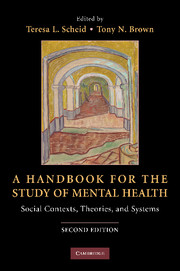Book contents
- A Handbook for the Study of Mental Health Second Edition
- A Handbook for the Study of Mental Health Second Edition
- Copyright page
- Dedication
- Contents
- Contributors
- Foreword
- Preface
- Part I Approaches to Mental Health and Illness: Conflicting Definitions and Emphases
- 1 An Overview of Sociological Perspectives on the Definitions, Causes, and Responses to Mental Health and Illness
- 2 The Measurement of Mental Disorder
- 3 The Prevalence of Mental Illness
- 4 Biological Theories of Psychiatric Disorders: A Sociological Approach
- 5 Psychological Approaches to Mental Illness
- 6 Sociological Approaches to Mental Illness
- 7 Viewing Mental Health from the Complete State Paradigm
- 8 Mental Health Systems in a Cross-Cultural Context
- Part II The Social Context of Mental Health and Illness
- Part III Mental Health Systems and Policy
- References
- Index
6 - Sociological Approaches to Mental Illness
from Part I - Approaches to Mental Health and Illness: Conflicting Definitions and Emphases
Published online by Cambridge University Press: 05 June 2012
- A Handbook for the Study of Mental Health Second Edition
- A Handbook for the Study of Mental Health Second Edition
- Copyright page
- Dedication
- Contents
- Contributors
- Foreword
- Preface
- Part I Approaches to Mental Health and Illness: Conflicting Definitions and Emphases
- 1 An Overview of Sociological Perspectives on the Definitions, Causes, and Responses to Mental Health and Illness
- 2 The Measurement of Mental Disorder
- 3 The Prevalence of Mental Illness
- 4 Biological Theories of Psychiatric Disorders: A Sociological Approach
- 5 Psychological Approaches to Mental Illness
- 6 Sociological Approaches to Mental Illness
- 7 Viewing Mental Health from the Complete State Paradigm
- 8 Mental Health Systems in a Cross-Cultural Context
- Part II The Social Context of Mental Health and Illness
- Part III Mental Health Systems and Policy
- References
- Index
Summary
- Type
- Chapter
- Information
- A Handbook for the Study of Mental HealthSocial Contexts, Theories, and Systems, pp. 106 - 124Publisher: Cambridge University PressPrint publication year: 2009
- 12
- Cited by

